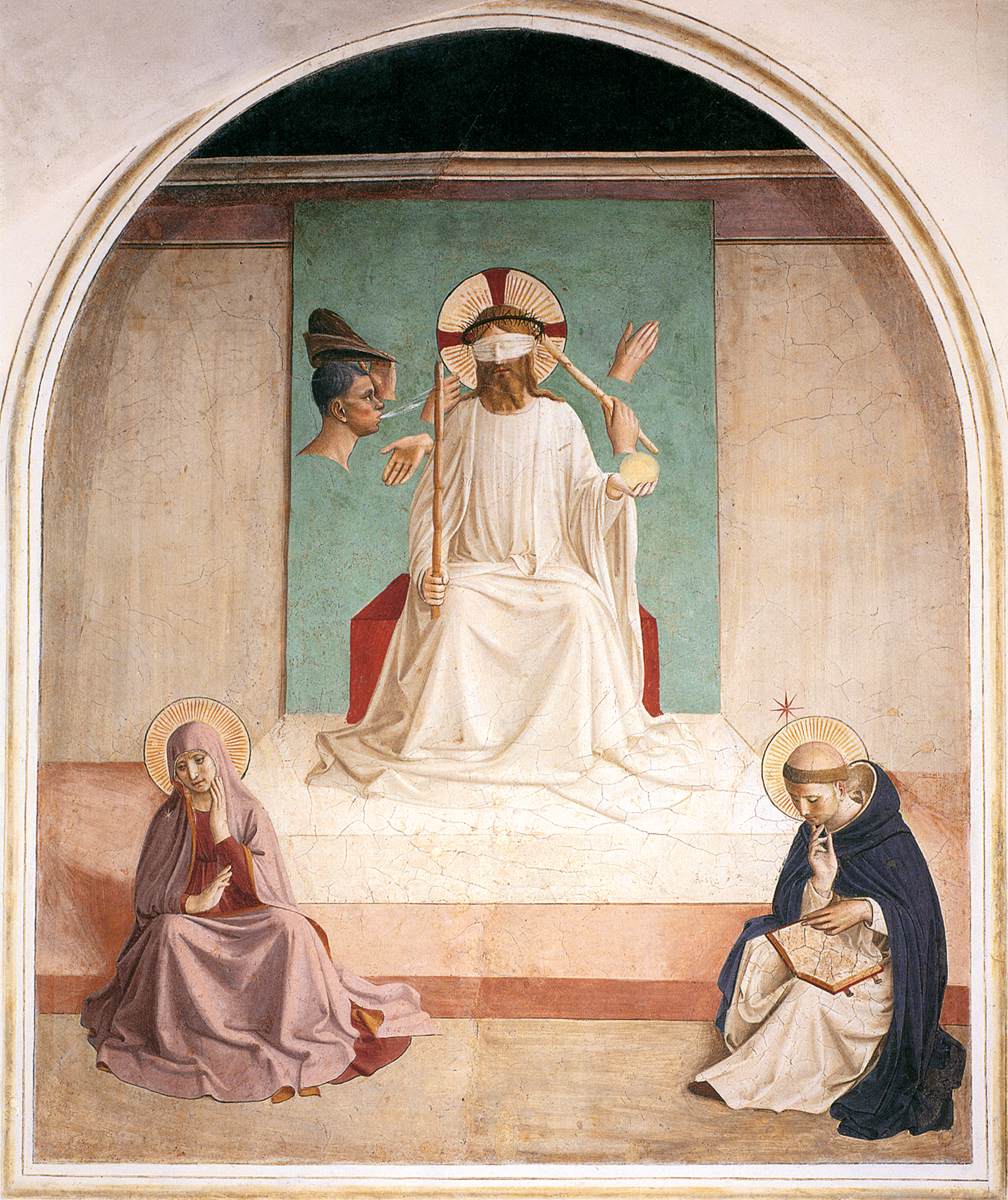[Greek] ἐμπτύω (emptuo), [Latin] sputare: to spit on; Mt.26:67, Mt.27:30, Mk.10:34, Mk.14:65, Mk.15:19, Lk. 18:32

The Mocking of Christ: painting by Fra Angelico (1440-1442)
Background information:
The Mocking of Christ: The painting shows an image of Christ sitting on a throne, wearing a thorn crown and being blindfolded. The painting depicts a king who is suffering. Angelico did not include the full bodies of His tormentors. Instead, Angelico shows the parts of the tormentors that are abusing Christ. There are four disembodied hands, two on each side. The hands on the right are prepared to slap Him and to strike Him with a rod. The hands on the left are prepared to slap Him and to pull His beard. A disembodied head spits on Him. On the bottom left appears the Virgin Mary looking down in sadness with her left hand pressed to her check. In contrast, she raises her other hand in a gesture of obedience to the divine will. On the bottom right appears St. Dominic looking down as he reads the account of the story and meditates on its meaning.
Greek Hellenism: This term means to spit at or be spit upon. Sophocles’ Antigone 1232 states “But the boy glared at him with savage eyes, spat in his face, and without a word, in response drew his twin-edged sword.” Xenophon’s Cyropaedia 8.1.42 states “He trained his associates also, not to spit or wipe the nose in public, and not to turn around to look at anything, as being men who wondered at nothing.” Sophocles’ Antigone 653 states “For what wound could strike deeper than a false friend? No, spit her out as if she were an enemy, let her go find a husband in Hades.”
Old Testament: This term means to spit upon. But the Lord said to Moses, ‘If her father had but spit in her face, would she not bear her shame for seven days? Let her be shut up for seven days outside the camp, and afterward she may be received again (Num.12:14). Then his brother’s wife shall come to him in the sight of the elders, and pull his sandal off and spit in his face; and she shall declare, ‘This it is done to the man who does not build up his brother’s house’ (Deu.25:9).
New Testament: This term also means to spit upon. In His ultimate fate in being led to the cross, Jesus was spit upon, struck, and scourged. Spitting someone in the face was perhaps the greatest form of contempt (disgrace) shown on someone else. Striking a person with fists on the temple was one of most despicable Greek punishments. Slapping someone with the back of one’s hand was also another form of contempt.
Conclusion:
Empty, sputum
It goes without saying that spitting on someone is a form of contempt in any time in history. In a sense, spitting can ‘cut’ such a deep wound as any sword attack. When one spits, one is emptying one’s saliva. Not surprisingly, the sound of spitting sounds like “ptuo”.
Update: For our new president to say that he is a “faithful Catholic” is a total mockery and contemptible to all truly faithful Catholics alike. This ‘Catholic’ president will soon eventually further promote abortion (the culture of death) and other anti-Catholic (Christian) policies in the months and years ahead. It is very difficult to have any respect for such a person like this!
I am myself empty. What else can I say about spitting?
